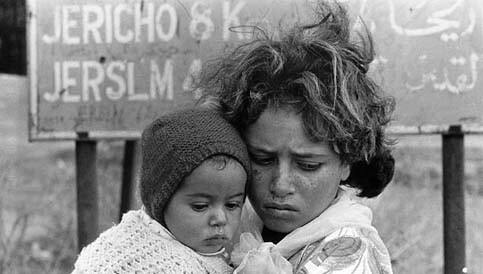United Nations Relief and Works Agency for Palestine Refugees in the Near East 4 June 2004

Palestinian refugees arriving in Jordan, crossing the temporary bridge, near to the destroyed Allenby Bridge, from the West Bank. The distances on the signboard, partially obscured, read “JERICHO 8 Km JERSLM 43 Km” (George Nemeh)
GENEVA — A total of 67 countries and 34 international organisations will gather at the Geneva International Conference Centre on 7-8 June 2004 for the largest conference on the Palestine refugee issue in 56 years. Around 300 delegates will discuss the future of humanitarian assistance to millions of refugees scattered across the Middle East.
In 1948 hundreds of thousands of Palestine refugees were displaced by the first Arab-Israeli war. Today those refugees and their descendents total over 4.1 million people, one third of whom still live in camps in Lebanon, Syria, Jordan, the Gaza Strip and the West Bank. The other two-thirds live in the towns and villages of the host countries, often close to the camps. The camps started life as tent cities and have developed into crowded urban ghettos, suffering from poor sanitation, dire levels of poverty and very high population densities.
The UN, in the form of the UN Relief and Works Agency for Palestine Refugees (UNRWA), provides basic education, free primary healthcare, relief and social services and micro-finance programmes to assist the human development of the refugees.
The two day conference in Geneva has been called to increase international support for the refugees’ needs. In four workshops sessions the main discussions will cover: the wellbeing of Palestine refugee children; housing, infrastructure and the environment in Palestine refugee camps; the socio-economic development of the refugees and the management and mobilization of resources on behalf of the refugees.
The Swiss Government, in the form of the Swiss Agency for Development and Cooperation (SDC), is hosting the conference in Geneva to help raise the profile of the refugees’ needs and to allow the conference to draw on the expertise of the city’s humanitarian community.
Countries such as the United States, Jordan and Sweden have been involved in the months of preparation for the conference by leading working groups on future plans, as have interGovernmental and international organisations such as the European Commission and UNICEF. NGO groups will be represented by three umbrella groups and multilateral aid institutions will also be involved.
More Information
Related Links